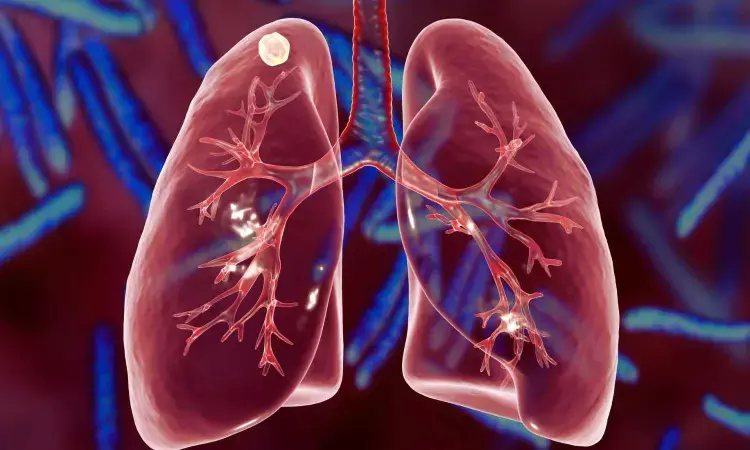- Home
- Medical news & Guidelines
- Anesthesiology
- Cardiology and CTVS
- Critical Care
- Dentistry
- Dermatology
- Diabetes and Endocrinology
- ENT
- Gastroenterology
- Medicine
- Nephrology
- Neurology
- Obstretics-Gynaecology
- Oncology
- Ophthalmology
- Orthopaedics
- Pediatrics-Neonatology
- Psychiatry
- Pulmonology
- Radiology
- Surgery
- Urology
- Laboratory Medicine
- Diet
- Nursing
- Paramedical
- Physiotherapy
- Health news
- Fact Check
- Bone Health Fact Check
- Brain Health Fact Check
- Cancer Related Fact Check
- Child Care Fact Check
- Dental and oral health fact check
- Diabetes and metabolic health fact check
- Diet and Nutrition Fact Check
- Eye and ENT Care Fact Check
- Fitness fact check
- Gut health fact check
- Heart health fact check
- Kidney health fact check
- Medical education fact check
- Men's health fact check
- Respiratory fact check
- Skin and hair care fact check
- Vaccine and Immunization fact check
- Women's health fact check
- AYUSH
- State News
- Andaman and Nicobar Islands
- Andhra Pradesh
- Arunachal Pradesh
- Assam
- Bihar
- Chandigarh
- Chattisgarh
- Dadra and Nagar Haveli
- Daman and Diu
- Delhi
- Goa
- Gujarat
- Haryana
- Himachal Pradesh
- Jammu & Kashmir
- Jharkhand
- Karnataka
- Kerala
- Ladakh
- Lakshadweep
- Madhya Pradesh
- Maharashtra
- Manipur
- Meghalaya
- Mizoram
- Nagaland
- Odisha
- Puducherry
- Punjab
- Rajasthan
- Sikkim
- Tamil Nadu
- Telangana
- Tripura
- Uttar Pradesh
- Uttrakhand
- West Bengal
- Medical Education
- Industry
Undernutrition, Smoking, and Alcohol Misuse Drive Poor TB Outcomes in India, suggests research

Researchers have found in a new study that undernutrition, alcohol abuse, and smoking account for over a third of TB outcomes in India that are unfavorable. The research determined that these factors greatly raise the risks of treatment failure, recurrence, and mortality in patients with drug-sensitive pulmonary TB, and they therefore present high-yield targets for public health interventions. The study was conducted by Pranay S. and colleagues in the journal of Chest.
The key question of this research was: What percentage of poor tuberculosis treatment outcomes can be explained by major risk factors in India? Through the estimation of attributable fractions (AFs), the authors aimed to identify the impact of these modifiable risk factors at the population level.
This was a prospective cohort trial in adult drug-sensitive pulmonary TB, recruited from five heterogeneous clinical centers in India. Participants were recruited at the start of treatment and were followed for 24 months. The main outcome was a composite poor treatment outcome, viz., treatment failure, recurrence, or death. Researchers estimated both unadjusted and adjusted attributable fractions (AFs) for modifiable risk factors such as undernutrition, smoking, alcohol abuse, diabetes, and HIV coinfection.
Results
• There were a total of 2930 adults with 32,912 person-months of follow-up. The median age was 43 years (IQR 31–52), and 2136 participants (72.9%) were male.
• The prevalence of risk factors was as follows: 1609 (55.5%) were undernourished, 1182 (40.4%) had ever smoked, 956 (32.8%) had diabetes, 437 (14.9%) had reported alcohol misuse, and 65 (2.2%) were HIV positive.
In the follow-up, 129 had treatment failure, 80 developed recurrence, and 101 died. The percentage of unfavorable outcome contributed by key risk factors in unadjusted analysis was:
• 32.2% (95% CI: 23.1–40.3) for undernutrition
• 19.4% (95% CI: 12.3–25.8) for ever-smoking
• 8.5% (95% CI: 4.3–12.6) for alcohol abuse
• 1.6% (95% CI: 0.1–3.0) for HIV coinfection
• Adjusted for having more than one risk factor concurrently, undernutrition by itself contributed to 29.0% (95% CI: 17.6–38.8) of all adverse outcomes.
• In addition, ever-smoking and alcohol abuse were significantly associated with failure of treatment, with 17.9% (95% CI: 1.1–31.9) and 15.4% (95% CI: 7.9–22.3) of failures, respectively.
This research indicates that undernutrition, smoking, and alcohol abuse explain more than one-third of adverse TB treatment results in India. Targeted efforts to enhance nutrition, decrease smoking, and prevent alcohol abuse have the potential to notably enhance TB outcomes and assist with attainment of public health objectives in TB control.
Reference:
Dr Riya Dave has completed dentistry from Gujarat University in 2022. She is a dentist and accomplished medical and scientific writer known for her commitment to bridging the gap between clinical expertise and accessible healthcare information. She has been actively involved in writing blogs related to health and wellness.
Dr Kamal Kant Kohli-MBBS, DTCD- a chest specialist with more than 30 years of practice and a flair for writing clinical articles, Dr Kamal Kant Kohli joined Medical Dialogues as a Chief Editor of Medical News. Besides writing articles, as an editor, he proofreads and verifies all the medical content published on Medical Dialogues including those coming from journals, studies,medical conferences,guidelines etc. Email: drkohli@medicaldialogues.in. Contact no. 011-43720751


